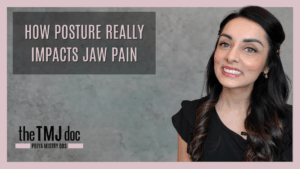Nearly everyone experiences high levels of stress at some point in their lives. Stress levels can get so high that they interfere with daily life – causing mental fatigue, emotional anguish, and physical pain! This pain can manifest in the jaw joints and the muscles that surround the head, neck, and jaw.
Stress and Anxiety
Stress and anxiety are not the same thing, although they often come together. Stress is caused by external triggers, such as work, family, or finances whereas anxiety is a persistent worry or fear that does not subside even when the stressor no longer is relevant. Interestingly though, stress and anxiety often present in the same way with difficulty sleeping, concentration issues, fatigue, irritability, and pain (including jaw pain!).
Stress can exacerbate TMJ/TMD due to increased clenching and grinding activity, and TMJ/TMD pain can lead to an increase in stress and anxiety. It’s a vicious cycle!
Temporomandibular Joint Disorder
TMJ disorder presents a wide range of symptoms. Common TMJ/TMD symptoms include but are not limited to facial pain, jaw pain, difficulty opening and closing the mouth, headaches, and pain that radiates to the neck and back. TMJ/TMD can also interfere with sleep, which causes a host of other issues like daytime fatigue, irritability, and difficulty concentrating. As you can imagine, poor quality sleep or lack of sleep is not ideal for someone dealing with stress or anxiety problems.
The Connection Between Stress, Anxiety, and TMJ Disorder
Stress or anxiety can cause a person to clench and grind their teeth while sleeping, known as bruxing. Many people with bruxism are unaware of their condition because it occurs while they are asleep. In some cases, individuals dealing with a significant amount of stress, or high levels of anxiety may exhibit bruxism during the day without realizing it.
Clenching and grinding activity involves MUCH more force than chewing, which strains the the jaw joints and the muscles of the head, neck, and jaw. This leads to inflammation, nerve irritation, reduced blood flow, and more. Bruxism can also damage teeth by wearing down the chewing surfaces, resulting in tooth fractures or the need for extractions – all of which also exacerbates TMJ issues!
If you are dealing with stress or an anxiety disorder, we encourage you to seek ways to improve your emotional state. This may look different for everyone and sometimes enlisting the help of a psychologist or therapist may help in dealing with stress or anxiety that you cannot handle on your own.
TMJ Dentist in Vancouver, WA
Treating TMJ/TMD often involves a multidisciplinary approach, especially as it relates to stress or anxiety. The good news is that you do not have live in pain because there is effective non-surgical TMJ/TMD treatment available! To learn more or schedule a consultation with Dr. Mistry, contact her office by calling (503) 255-8293.







